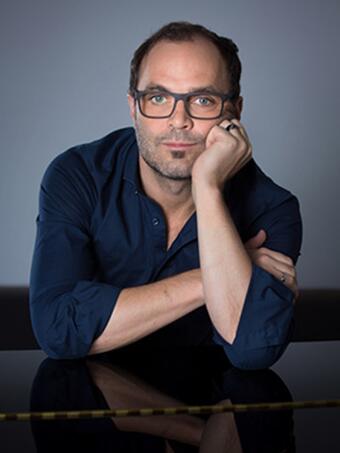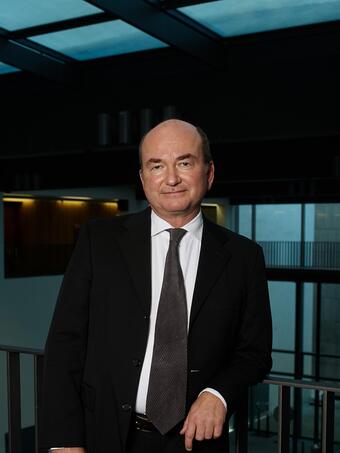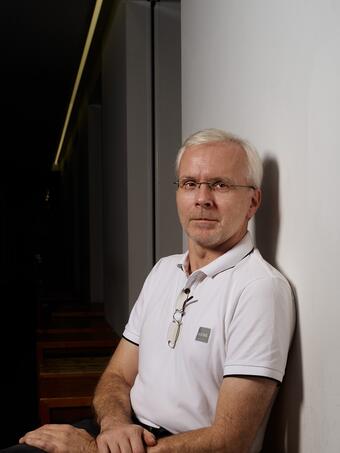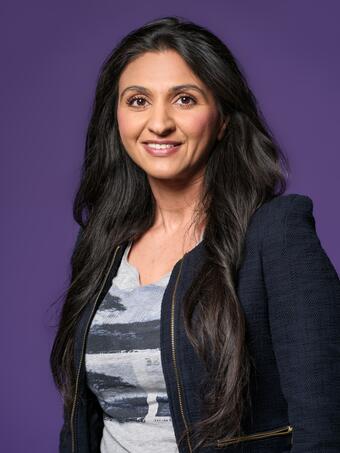Choral Conducting

Overview
The bachelor's degree programme in Choral Conducting aims to develop students' artistic maturity and independence in all areas of choral conducting. Right from the outset, the course teaches a solid, technical foundation so that students can convey their own musical ideas across a broad range of repertoire, from early to new music and covering everything from a cappella to symphonic and operatic works.
Department of Studies & Examinations
+43 676 88122 492
studienabteilung@moz.ac.at
Length of course
8 semesters / 240 ECTS-AP
Language
German
Application period
1.2.–28.2.2025
Auditions
summer semester each year
dates see at "Audition dates"
overview of all dates
Downloads
General information
The study programme is oriented to current standards of performance practice as well as the state of research in the academic disciplines involved. The aim of the Bachelor's programme in Choral Conducting is to provide students with a practice-oriented and academically grounded education as preparation for work in the following fields:
- Chorus master of professional choirs (opera, theatre, radio)
- Director of oratorio choirs
- Director of specialised a cappella choirs (sacred and secular)
- Director of semi-professional choirs and amateur choirs
- Church musician
- Ensemble director
- Répétiteur
- Advisor and counsellor of singers
- Teaching in the field of choir/ensemble
Furthermore, the course qualifies students for professional activities that require the application of artistic and academic knowledge and methods, for example in the field of recording management, cultural management, publishing, source evaluation, musicology, etc. oreover, the degree course should contribute to students' personal development and the furthering of their social competences. Students will learn to perceive and help shape developments in the arts and in society as a whole.
The goals of the BA in Performance at the Mozarteum University are artistic maturity and independence, critical self-reflection and evaluation, and the artistic and scientific ability to interpret musical works from all periods. The BA in Performance will equip students to pursue their chosen profession and to fulfil artistic, pedagogical and organisational tasks within cultural life.
The curriculum is competence-oriented. After completing the Bachelor's programme, students should:
- be able to master their instrument and present themselves professionally
- be free and independent in their artistic work
- be able to deal critically with artistic and academic issues
- be able to play professionally in an orchestra/ensemble
- be able to work as a team-player in an artistically constructive way as a member of a chamber music formation or ensemble
- have acquired comprehensive knowledge of various playing techniques
- have acquired comprehensive knowledge of the orchestral repertoire and mastery of the relevant orchestral parts and the solo and chamber music literature of various periods
- have basic knowledge of stylistics and repertoire
- have gained insight into the repertoire and performance practice of both early and contemporary music
- have acquired comprehensive knowledge of music theory and musicology and be able to apply this in practice
- have mastered the basics of scholarly working practices and be able to analyse, interpret and write about artistic content in a grounded manner
- be able to use audiovisual media for self-presentations (such as competition submissions, demo recordings, internet presentations etc.)
- have gained insights into the areas of physical and mental health maintenance, self-management and performance optimisation
- have further developed their individual interests beyond their own subject area through targeted selection of elective subjects in the spirit of lifelong learning
The six-semester bachelor's degree programme is modular in structure. Each module comprises teaching and learning content that has been combined to form thematically and didactically meaningful units of study. The names and content descriptions (study objectives) of the individual modules, the number of ECTS credits to be achieved for each module, and the type of performance assessment are specified in the curriculum. The module descriptions refer to the corresponding learning outcomes and competencies. The Bachelor's programme is a face-to-face programme and cannot be offered - not even in part - as a distance learning programme. The courses from the Principal Study, as well as in other One-to-One Tuition, are designed to build upon each other. Prerequisite for enrolment in courses from the Principal Study or One-to-One Tutition is a positive evaluation of the previous semester (from the second semester onwards).
The curriculum provides an overview of the courses to be completed, which are grouped into modules.
The courses are visible online in Curriculum Support:
A prerequisite for beginning a bachelor's degree (BA) is passing an audition. Auditions take place once a year and consist of various partial exams. All information about the audition can be found under “Information about the admissions procedure” further down the page.
A high school diploma is not necessary.
PLEASE NOTE: You can only apply for study programmes for which you have not yet obtained a degree!
Students of the Bachelor's programme are encouraged to complete a semester abroad. Semesters 5 and 6 of the degree programme are particularly suitable for this. In addition to subject-specific competences, a study period abroad can also lead to the acquisition and deepening of:
- Subject-specific foreign language skills
- General foreign-language skills (language comprehension, conversation, etc.)
- Organisational skills, through independent planning of everyday student life in international administrative and university structures
- Knowledge about international study systems, as well as broadening one's own subject perspective
- Intercultural competences
Examinations and assessments taken during studies abroad can be approved by the Director of Studies as equivalents to compulsory subjects, elective sujects or free elective subjects required by the Mozarteum University for your degree course. The documents required for the approval procedure are to be submitted by the applicant immediately after their exchange semester.
Details at International Affairs.
In addition to weekly lessons in small groups and work with the practice choir and the Mozarteum UniChor, students of choral conducting at the Mozarteum University have numerous other internal and external opportunities to apply the course content in practice. The range of activities is broad, including holding soloist and choir rehearsals, participating in workshops with international speakers and different stylistic focuses, independently rehearsing and conducting concerts in university and public spaces.
Where possible, networking with regional choirs will be encouraged and facilitated, enabling the aspiring choral directors to gain valuable experience in leadership, voice training, project management and musical work.
- Nov. 19.: Opera chorus workshop / Chorus of the Gärtnerplatztheater Munich
- Dez. 19: A cappella workshop / Chor der Klangverwaltung
- Okt. 20: Conducting project - Haydn: Creation / Mozarteum University Symphony Orchestra
- Okt. 20: Workshop and conducting project - Brahms Requiem / Chor der Klangverwaltung
- Apr. 21: Workshop - St Matthew Passion / Festspiele Erl / Chor der Klangverwaltung
- Juni 21: Conducting (examination) Orff: Carmina Burana / Mozarteum vocalEnsemble
- Okt. 21: Conducting project - Mozart Requiem / Mozarteum vocalEnsemble / Mozarteum University Chamber Orchestra
- Jan. 22: Opera chorus workshop / Chorus of the Semperoper Dresden
- Mär. 22: Conducting project - Schütz Exequien and Brahms Requiem / Mozarteum vocalEnsemble / Mozarteum University Symphony Orchestra
- Jun. 22: Opera chorus workshop / Chorus of the Gärtnerplatztheater Munich
- Okt. 22: Conduction (examination) Schütz: Psalms of David / Mozarteum vocalEnsemble
- Nov. 22: Opera chorus workshop / Chorus of the Stadttheater Klagenfurt
- Dez. 22: Conducting project "School choir meeting" / Mozarteum UniChor
- Jan. 23: a cappella conducting project - Poulenc and Fauré requieums / Mozarteum vocalEnsemble
- Mär. 23: Workshop - St John Passion / Soloists from the oratorio class
- Apr. 23: A cappella workshop / Christiane Büttig / Dresden University Choir
- Mai 23: Workshop on Gregorian Chant / Dr. Stefan Engels / Virgilchoralschola
After completing the Bachelor's programme in Choral Conducting, students may wish to continue their studies in one of the following Master's programmes at the Mozarteum University:
- MA Choral Conducting
- MA Wind Orchestra Conducting
- MA Repetiteur Training
- MA Historical Performance Practice
Please note that a regular admissions procedure (incl. audition) must be completed again for admission to the Master's programmes!
Information on the admissions process
A prerequisite for admission to the Bachelor's degree programme (BA) is passing an audition, for which applicants must register online via Muvac. Following approval of the application by the university’s admissions office, applicants will be invited to upload an application video to Muvac. Applicants who pass the video round will be invited to an on-site audition in Salzburg.
PLEASE NOTE:
- Evaluation of all application videos will commence only after the deadline for video uploads (20.03.2025) has passed, and can take up to 4 weeks!
- Applicants can only apply for degree programmes for which they have not yet obtained a degree!
A pre-selection of applicants will be made by the audition panel based on the videos submitted. The selected applicants will be invited to an on-site audition, which consists of several parts.
2. Once in the MOZonline account: fill in the mandatory statistics UHstat1 (pre-registration for studies) and make a note of the application number that is sent by email upon submission of this information.
3. Create an application account in Muvac
4. Fill out your own profile in Muvac (minimum requirements: personal data, information on expertise matching the desired degree programme, in the CV: current employment and information on previous training)
6. Fill out the application form in Muvac ("Apply now"), being sure to enter your application number (see step 2) or Austrian matriculation number in the appropriate field
Please take a look at the FAQs about registration in Muvac if you have any problems.
- Online registration during the application period via the application portal Muvac (Please note: Registration is only possible if all required information and documents have been submitted!)
- Once the online application has been processed: invitation to the video pre-selection in Muvac; the application video must be uploaded there by the deadline specified.
- If successful in the pre-selection (video) round: invitation to an online interview. The invitation will be issued via Muvac, where it must be accepted or rejected.
- If succesful in the online interview: invitation to the on-site audition (the invitation is sent via Muvac)
- The invitation to audition on-site must be accepted or rejected in Muvac; information on the audition programme in the principal study must be provided if required by the instrument/degree programme in question
- participation in the on-site audition
- Upon passing the audition and being offered a place: invitation to enrol in the degree programme
- Enrolment (in person) during the general admission period
A pre-selection of applicants will be made by the audition panel based on the videos submitted.
- Applicants should upload a video of themselves conducting a choir or ensemble (consisting of at least 5 singers) in a work of the applicant's choice, briefly showing the ensemble but mainly the face and body of the applicant.
Applicants are requested to ensure in advance that the singers captured on video and audio have given their consent for the recordings to be submitted as part of the audition. The Mozarteum University Salzburg accepts no responsibility in cases of dispute.
The duration of the video should be approx. 8-10 minutes.
General information on the application video is listed below. Applicants are kindly requested to adhere to the guidelines given here!
Upon successful processing of their application, applicants will be invited to the video pre-selection round in Muvac.
Applicants who wish to accept the invitation must upload their video by 20th March 2025.
If an applicant fails to confirm their participation in the video pre-selection in Muvac before the deadline, and therefore does not upload a video, their application will not be considered and the status of the application will be changed to "did not participate". In this case, the application process will automatically be discontinued.
Video files are to be created by the applicant themselves and uploaded to the application platform Muvac. The following guidelines must be observed:
- Both the face and body of the applicant must be visible in the video.
- The picture and sound quality of the video should be as good as possible. If the sound and/or image quality is insufficient, the video will not be considered.
- The sound recording in the video must not be electronically amplified or altered.
- Video editing is not permitted* - the recording must not be edited/cut and must run from beginning to end. Exactly one video must be submitted per application.
- Information on the content and duration of the video is given on the web page of the relevant degree programme.
- If possible, the names of the pieces should be given in the video description (title of the video in Muvac).
Piano accompaniment in the video
- String instruments (except for solo pieces).
- Wind instruments (exception for recorder: harpsichord accompaniment; for oboe and bassoon: piano or harpsichord accompaniment)
The online interview with the audition panel will cover motivation, background, previous studies and expectations, and the candidate's video submission. Candidates will receive an appointment and a link to a video conference tool in advance, and are advised that a stable internet connection is required at the specified time (probably mid-April), as well as a PC/laptop with camera and microphone.
The interview will take place via ZOOM and will last approximately 10 minutes.
After passing part A, candidates will be admitted to parts B-F.
Conducting with choir or vocal ensemble:
- Two vocal works, one of which is a capella (e.g. Goffredo Petrassi: Nonsense (1952), a chorus from Haydn: Creation).
- Duration of the examination: approx. 10-20 minutes
- The two works will be announced to the applicants when they register for the audition.
Works for the auditions 2025:
A cappella:
Edward Elgar - The Prince of Sleep
Conducting with piano, soloist and choir:
Felix Mendelssohn - Paulus, Nr. 9 Recitativo und Choral "Und sie steinigten ihn"
Playing a piano excerpt from opera or oratorio literature as well as sight-reading, duration approx. 10-15 minutes
Programme:
- Performance (i.e. playing and singing from the piano) of a short opera scene from a German, Italian or French opera chosen and prepared by the applicant (in the original language, e.g. an accompagnato recitative or an aria from an opera).
- Sight-reading of an excerpt from an opera or oratorio.
There is no obligation that vocal scores, which are already reductions of full opera scores, are played literally. Instead, they should be further reduced as necessary according to the player's pianistic ability.
The examination consists of a written and an oral part. In order to pass, both parts of the examination must be passed.
Written examination (180 min)
Composition: (120 min)
- Harmonising a chorale melody in baroque style;
- Preparation of a stylistic work of your choice: two-part counterpoint (cantus-firmus movement in Renaissance style or invention in Baroque style) OR free-tonal or dodecaphonic style exercise;
- Analysis of your choice: analysis of a short tonal piano piece in terms of form, harmony, compositional technique OR analysis of a small-scale work/piano piece in terms of form, harmony, compositional technique (20th century).
Aural skills: (60 min)
- one-part free tonal,
- two-part classical (e.g. minuet by Mozart or Haydn),
- free-tonal three-part tonal progression with recumbent notes or chromaticism,
- four-part homophonic tonal including the identification of deliberate mistakes
Oral examination (10 min):
- Sight reading
- Identifying deliberate mistakes in a harmony
- tapping a two-part rhythm (according to notation)
You can find an exam example and further preparation help (only the basics!) HERE.
Advanced piano playing, audition lasting approx. 10 minutes:
- Performance of two prepared piano pieces of medium difficulty, one of them from the 20th century, e.g.:
Bach: two or three-part invention;
a piano piece in the classical style (e.g. a bagatelle by Beethoven, a sonata movement by Clementi),
Bartók: Mikrokosmos Vol. III, Kurtág: Játékok Vol. III. - Sight-reading of a piece (lower level of difficulty, e.g. Bach: Klavierbüchlein Anna Magdalena Bach, Schumann: Album für die Jugend, Bartók Mikrokosmos Vol. II) OR improvisation on a given theme/motif
Performance of two art songs or arias of medium difficulty from different stylistic periods, including one piece from the Romantic or Modern periods. With the exception of the modern piece, the programme must be performed from memory. The candidate must bring copies of their sheet music with them.
Examples of suitable repertoire: Heinrich Schütz: from Kleine Geistliche Konzert: Bringt her dem Herren; John Dowland: Fine Knacks for Ladies; Alessandro Scarlatti: Giàilsoledal Gange / Se Florindo è fedele; Ludwig van Beethoven: Mailied; Wolfgang Amadeus Mozart: Zufriedenheit (Was frag ich viel) / Zauberer; Franz Schubert: Liebhaber in allen Gestalten / An Silvia; Felix Mendelssohn Bartholdy: Bei der Wiege / Winterlied; Robert Schumann: Frühlingsgruß; Clara Schumann: Sie liebten sich beide; Johannes Brahms: Sonntag / Deutsche Volkslieder / Vergebliches Ständchen; Hugo Wolf: Der Musikant; Samuel Barber: The Daisies; Wolfgang Fortner: Lied vom Weidenbaum; Hanns Eisler: from Hollywood Elegies: The City / In the Hills; Benjamin Britten: Morning, Night
All applicants whose first language is not German must prove their German skills by the time of enrolment at the latest.
- Required language level: at least A2 (Common European Framework of Reference for Languages GER 2001)
- Information on the approved language certificates can be found HERE
Application video: upload in Muvac possible until 20.3.2025
Exam A - Online interview to determine artistic aptitude: 4.4.2025
Exam B - Choral Conducting: 8.5.-9.5.2025
Exam C - Playing a piano reduction: 8.5.-9.5.2025
Exam D - Music theory & Aural skills: 9.5.2025
Exam E - Examination of advanced piano playing: 9.5.2025
Exam F - Vocal audition: 9.5.2025
Exam G - German language skills: certificate (to be presented upon enrolment)
Please note that the Mozarteum University Salzburg offers various support options at the time of your audition and during your studies if you have a disability or a chronic illness.
If this applies to you and you would like to take advantage of counselling, please contact Claudia Haitzmann: claudia.haitzmann@moz.ac.at or +43 676 88122 337.
Any questions?
You can find more information about starting your studies here:




